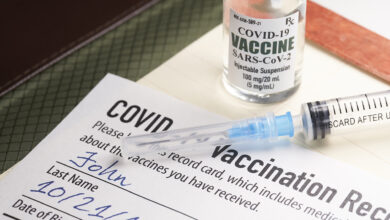Implanted device stimulates patient’s brain, treats severe depression, researchers find

A woman with severe depression saw near-immediate relief when treated with a surgically implanted device to stimulate the neural circuit causing the illness, researchers at the University of California San Francisco announced Monday.
The so-called “deep brain stimulation” (DBS) device was described as the equivalent of a pacemaker for the brain, according to a university release posted Monday, with a report on the proof-of-principle trial published in the Nature Medicine journal.
“This study points the way to a new paradigm that is desperately needed in psychiatry,” Andrew Krystal, PhD, professor of psychiatry and member of the UCSF Weill Institute for Neurosciences, said in a statement. “We’ve developed a precision-medicine approach that has successfully managed our patient’s treatment-resistant depression by identifying and modulating the circuit in her brain that’s uniquely associated with her symptoms.”
EARLY ADULTHOOD DEPRESSION INCREASES DEMENTIA RISK, STUDY FINDS
Researchers said that prior clinical trials on DBS only indicated limited success in treating depression because most devices offer constant electrical stimulation, usually in one area of the brain, whereas depression may affect different areas of the brain for different people. This time, the early findings were deemed successful because researchers discovered a neural biomarker, described as “a specific pattern of brain activity that indicates the onset of symptoms,” and then customized the device to respond only upon detection of that pattern.
The team of researchers cautioned that the findings stemmed from the first patient in the trial, and more work needs to be done. Nevertheless, the personalized therapy involved placing an electrode lead in the patient’s brain area found with the biomarker to monitor activity, and another lead was placed in the patient’s depression circuit, that when treated, best relieved the patient’s mood symptoms.
When the first lead “detected the biomarker, the device signaled the other lead to deliver a tiny (1mA) dose of electricity for 6 seconds, which caused the neural activity to change, the release reads. Researchers assessed the approach in June under an FDA investigational device exemption, and according to the university, FDA approval for the treatment is “still far down the road.”
However, the patient’s near-immediate benefit contrasted to a reported 4-8 week delay of standard treatment models and her symptoms have been eased for over 15 months since the device was implanted, according to the university.
“I was at the end of the line,” said the patient, Sarah, who requested to be identified by her first name. “I was severely depressed. I could not see myself continuing if this was all I’d be able to do, if I could never move beyond this. It was not a life worth living.”
The findings were said to have resulted from former President Obama’s BRAIN (Brain Research through Advancing Innovative Neurotechnologies) Initiative in 2014, followed by studies led by UCSF neurosurgeon Dr. Edward Chang and others on depression and anxiety among patients surgically treated for epilepsy, finding that new areas of the brain could be stimulated to alleviate depressed mood, among other results.
CLICK HERE TO GET THE FOX NEWS APP
“The effectiveness of this therapy showed that not only did we identify the correct brain circuit and biomarker, but we were able to replicate it at an entirely different, later phase in the trial using the implanted device,” said first author Katherine Scangos in a statement. “This success in itself is an incredible advancement in our knowledge of the brain function that underlies mental illness.”
The treated patient, Sarah, said that a combination of the therapy and self-care has so far stopped a cycle of irrational thoughts and emotional triggers.
Further research efforts will examine varying circuits across patients and whether biomarkers or brain circuits change over time during the treatment period, Scangos said.
Source link





